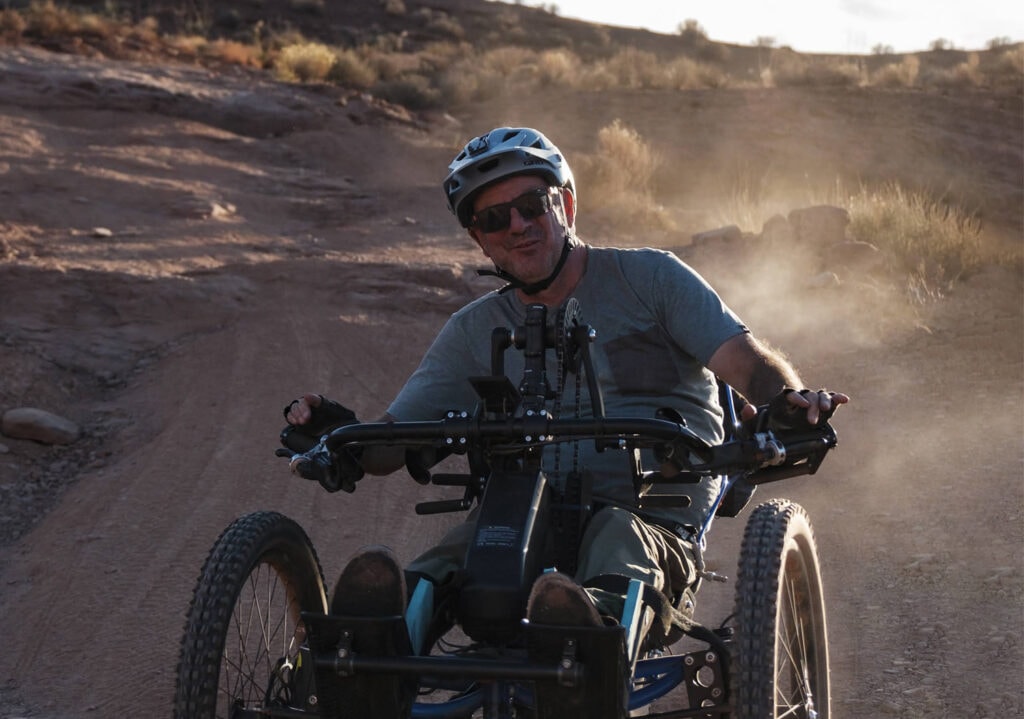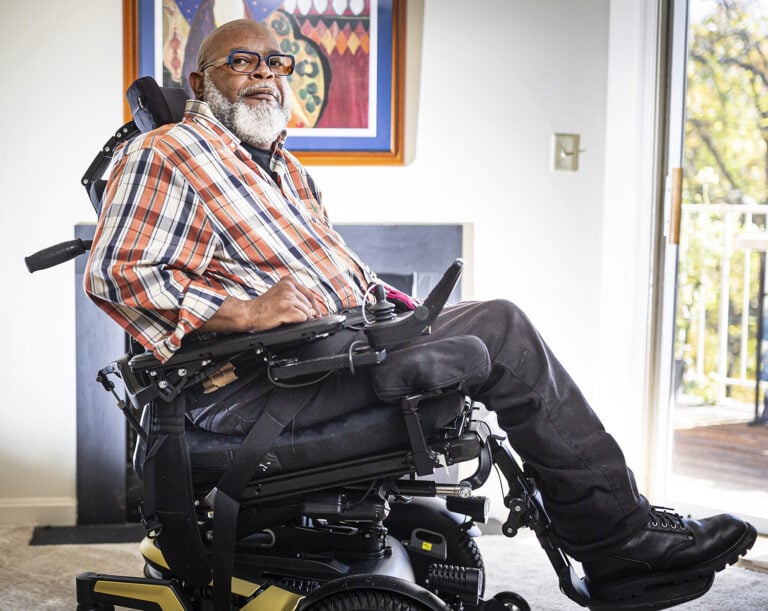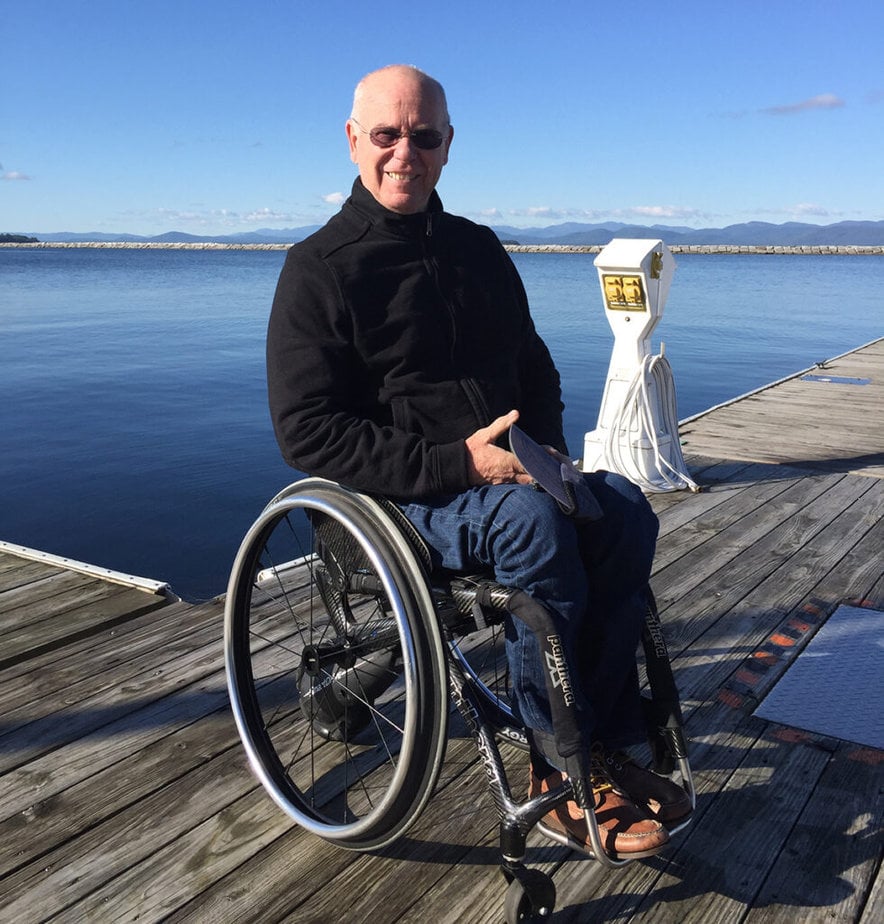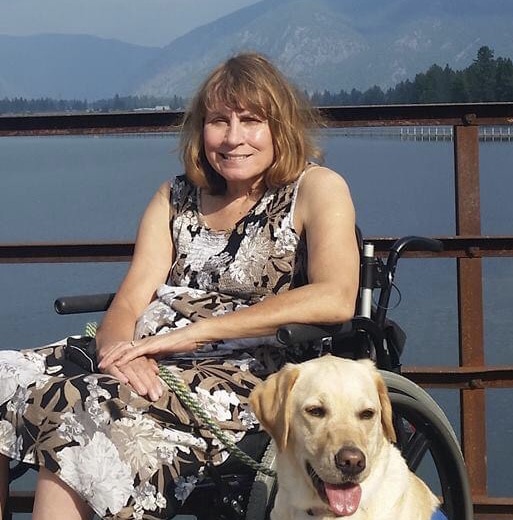
When I was a newly minted T10 para, I recall a conversation with a friend who was three years post-injury, a T6 para, who had also become a mentor. He flew hang gliders, sailed, water skied, had a girlfriend and was getting A’s in college. Although I had accepted my injury and I was getting back into life full tilt, I admitted that I secretly hoped for a SCI cure in the near future. He said, “Look at it this way. Let’s say a cure never comes, or it does, but not for 30 years. Think of yourself 30 years from now and ask, ‘What did I do? Did I push the pedal to the metal and have a life of adventure that I can fondly look back on? Or did I sit on the couch waiting for a cure?’”
I took that advice to heart. Thirty-seven years later, I’m grateful I chose a life of travel and adventure, ranging from hang gliding at 20,000 feet to scuba diving pristine reefs, not to mention friendships, love and being a dad to an amazing daughter.
Here are some nuggets of wisdom from veteran wheelers on how to survive and thrive with SCI.
The Wise Wheelers
Steve Ackerman, 69, T9, 36 years post-injury
Theo Braddy, 63, C4-5, 48 years post-injury
Connie Brittain, 66, C7, 42 years post-injury
Topher Downham, 54, C6-7, 27 years post-injury
Craig Gray, 67, T11, 44 years post-injury
Nancy Becker Kennedy, 71, C5-6, 50 years post-injury
Bob Vogel, 62, T10, 37 years post-injury
Best Advice Received
TOPHER DOWNHAM: “Hang out with people who push you past your limits. A neighbor of mine was a seasoned para and would not let me just sit on my laurels, like how I couldn’t get into his truck. He would gently taunt me: ‘Oh the poor little quad,’ ‘I can’t do this.’ We figured it out together, eventually using a pillow on the ledge of his truck so I could transfer from my chair to the ledge, then up to the seat. He and I took long road trips together, and it was a blast.”
BOB VOGEL: “Someone in rehab told me to check out vocational rehabilitation. Though terrified, I did, and they ended up paying for me — a high school dropout — to earn a B.A., which led to travel, friendships and adventures, including winning an Emmy award.”
CONNIE BRITTAIN: “’Check your skin with a mirror before going to bed and anytime you get a new cushion’ is what I learned in rehab. And be careful where you sit. Check first with your hands that it isn’t too hot, or there isn’t something too hard before sitting.”
THEO BRADDY: “If something is happening to you as a disabled person, it is definitely happening to other disabled people, and it’s a good indication there is a system advocacy issue.”

Photo © 2022 PennLive
Theo Braddy
CRAIG GRAY: “In my early post-injury days, my rehab doc advised that I had to develop the medical knowledge of my own condition so that I can be my own advocate. I work with doctors, but I’m always going to be verifying information.” [This advice likely saved his life when he developed a deep-tissue pressure sore, spiked a fever of 106 and suspected he had osteomyelitis]. “The doc didn’t believe paras could get osteomyelitis, and since she was the primary doctor treating me, she intervened when I tried to speak with other doctors in the system. I finally got to see another doctor who excised the wound, found the osteomyelitis and got me on the right track.”
STEVE ACKERMAN: “Hope for the best, plan for the worst. … You don’t necessarily ever get used to being paralyzed, but you DO get better at it.”
Best Advice Given
GRAY: “Be sure you keep your spine and shoulders flexible and keep stretching, because as we age, things stiffen up, and it becomes next to impossible to regain flexibility. I took flexibility for granted in my 30s and 40s. Now, in my 60s, I do stretching, but at my age it is too little too late.”
DOWNHAM: “Travel as much as possible. Don’t be afraid to do things because of what ‘might’ happen. Like you ‘might’ crap in your pants, and you can stay home all the time if you are afraid, but you will miss out on life. And if you do crap your pants, it won’t kill you, you can get cleaned up and eventually it can become comedy. I was invited to Japan to race downhill off-road wheelchairs, and I crapped my pants during the race! At the bottom, somebody helped me to the hotel, I got cleaned up and put it in my rearview mirror. It would have been horrible to miss the travel and adventure for fear of a bowel accident.”
VOGEL: “I encourage people to try cognitive restructuring — turning negative thoughts into positive ones by thinking of difficult things about SCI as things you love. As someone who loves scuba diving, I restructure the often frustrating and overwhelming task of monitoring my body post-SCI by comparing it to scuba diving, where you have to constantly scan gauges to check depth, time, remaining air, etc. When you’re diving it’s cool and vital to safety, and I’ve chosen to feel it’s just as cool to do this with SCI.”

Best Advice for Dealing with Doctors
NANCY BECKER KENNEDY: “Look for a doctor that works collaboratively with you as a team and when you find one, hang on to them. If possible, find a good SCI rehab [physical medicine and rehabilitation] doctor to be your primary care doc because they have a better understanding of your SCI. I had a great PM&R doc for 35 years, and I told him, ‘You better not die.’”
DOWNHAM: “It is important to stand up for yourself. Try and find a primary care doctor who is open to your opinion. Over time I’ve learned how my SCI body works better than most doctors, so if I get advice that doesn’t seem correct, I question it. If possible, try and find a doctor or a center like Craig Hospital that has lots of experience with SCI. An experienced PM&R doc is able to figure out things a lot quicker because they have likely experienced it in a patient already.”
Make sure you develop and leverage a large, strong community of wheelchair users to help you understand what medical and life options may be available to you.
Craig Gray
BRADDY: “Make sure your doctor takes the time to fully understand your disability. They should listen to you; if they don’t, find another who will. Remember, doctors are human too. They can get things wrong.”
GRAY: “Docs and nurses, despite their best intentions, aren’t always the best source for information for living with SCI. Make sure you develop and leverage a large, strong community of wheelchair users to help you understand what medical and life options may be available to you.”
BRITTAIN: “We know our bodies better than most doctors, so try and develop a team approach to work with your doctor.”
ACKERMAN: “Don’t go to the doctor unless you really have to. A hospital isn’t any place you want to be if you are sick or tired.”

Best Advice on Staying Healthy
BRADDY: “Learn to pay attention to what your body is telling you. Whether it’s sweating all of a sudden, a headache, or a muscle spasm where you rarely have them, your body will tell you when something is wrong. Pay attention and you can avoid a lot of trouble.”
VOGEL: “Drink lots of water, keep your weight down to take stress off of your shoulders, and be careful about foods with sugar and carbs because they cause inflammation.”
GRAY: “Water is your body’s friend; sugary drinks are your body’s enemy.” [Gray adds that eating the correct amount of fiber is important, and so is the type of fiber you eat. Seek a balance of soluble fiber (fruits, vegetables and psyllium — fiber that dissolves into a gellike material in water) and nonsoluble fiber (wheat bran, vegetables and whole grains). This is vital in maintaining a healthy bowel program]. “I find when I maintain a healthy bowel program, it helps reduce UTIs.”
Strive for balance … but it’s OK to have a bit of cake now and then.
Connie Brittain
BECKER KENNEDY: “I try and eat a lot of organic fruits and vegetables, but I also look for balance, which means every once in a great while, having a really good steak. And, of course, a little wine from time to time. One thing about eating really healthy is that after a while, food that isn’t healthy doesn’t taste good anymore.”
BRITTAIN: “It’s important to strive for a balance of spiritual health, physical health and emotional health. If you are eating well but not dealing with an emotional problem, you will have difficulty. And it’s OK to have a bit of cake now and then.”
ACKERMAN: “Make your workout your first appointment. Whatever it is that you do for exercise, make it your first priority.”
Best Advice for Hard Times
VOGEL: “Good friends and good cardio are great ways to get your endorphins up and make yourself feel better.”
GRAY: “Develop and maintain a large community of friendships with other wheelchair users with SCI to help you understand and navigate the SCI world and who you can talk with about SCI issues. They will get you right away. Chances are they have been there and likely have some good insight, can put things in perspective and perhaps add some humor.”
BECKER KENNEDY: “Concentrate on being positive.”
BRADDY: “Identify who is truly a friend. This is not a social media friend. It is someone who will drop what they are doing and come to assist you. Anyone can assist you when it is convenient. True friends will assist when it is not convenient.”
BRITTAIN: [Sometimes you just have to smash things.] “I was going through a really difficult time because somebody dear to me had passed. I told my boys to bring a watermelon from the kitchen into the backyard and bring a sledgehammer. I started crushing it with the sledgehammer, taking out my anger and hurt. A neighbor asked, ‘What are you doing over there?’ And I said, ‘It’s OK, my sister died.’”
DOWNHAM: “When times are hard, get out of the house and go into motion, like handcycling on a trail through the woods. Pushing my chair in nature is how I deal with difficult times. Like during Covid, you weren’t supposed to go outside. Hell yeah, I went outside! Get off the computer and get outside and have some motion every day.”
Best SCI-Related Financial Advice
VOGEL: “Read Social Security’s The Red Book cover to cover, as there are lots of opportunities to try work and keep your benefits. Also check out their Ticket to Work program, which offers assistance getting into the work force.”
GRAY: “If you are fortunate enough to work at a company that has a 401(k), maximize your donations to it, and if you can at all, tuck away some money, even if it’s just five bucks a week, in a separate account because even the best insurance is not going to cover your needs.” [Gray says the extra savings came in handy covering $10,000 of treatments that helped him avoid shoulder surgery but were not covered by insurance.]
BECKER KENNEDY: “Learning about various SSDI programs like PASS (Plan to Achieve Self Support) enabled me to keep working and keep my benefits.” [To cope with a lengthy hospitalization, Kennedy got a Waiver Personal Care Services waiver for people that have been in the hospital for more than two months and need 24-hour care.] “Without the WPCS waiver, I would have lost my home and ended up in a nursing home. It enabled me to have full-time care at home.”
BRADDY: “Start an ABLE [Achieving a Better Life Experience] account as a tax-free way to save for disability-related expenses, while maintaining government benefits. If an ABLE account is not available, look for a similar program or put away a saving account for emergency assistive technology repair or purchase.”
BRITTAIN: “Be sure to save all SSDI receipts, letters, as well as work receipts, expenses, etc. If you are going to return to work, know the rules.”
DOWNHAM: “I’m a big fan of getting off the government tit as soon as possible because it’s a trap that can be hard to get out of. In 2005 I had an opportunity to take a full-time job at $35,000 a year and it was scary, but it was worth it, and I haven’t looked back.”
Support New MobilityWait! Before you wander off to other parts of the internet, please consider supporting New Mobility. For more than three decades, New Mobility has published groundbreaking content for active wheelchair users. We share practical advice from wheelchair users across the country, review life-changing technology and demand equity in healthcare, travel and all facets of life. But none of this is cheap, easy or profitable. Your support helps us give wheelchair users the resources to build a fulfilling life. |


Too bad no one mentioned either CareCure.net or the Craig Hospital Nurse advice line. They can be sources of great advice and information.
thanks…i’ll check it out.
Carecure.net has been a lifesaver for me. An incredible resource.